Enryakuji Temple & Hie-zan Driveway 延暦寺・比叡山
|
|
|

Headquarters of the Tendai Buddhist sect, Enryakuji is a large complex of temples, halls, buildings, and monuments on Mt. Hiei in Otsu, Shiga Prefecture. It boasts buildings which are National Treasures. MAP
|
|

On the foot of Mt. Hie on the Shiga side is the temple town of Sakamoto. From here, take the cable car up to Enryakuji. Also accessible from Kyoto and by bus/car via the Hie-zan Driveway. Near JR Hiezan Sakamoto Station/Keihan Sakamoto Station.
|
|

Enryakuji has three temple complexes. The main and largest one is called Todo (Toto 東塔) seen on the left on this map. On the right is the Saito temple complex. The summit has a tourist attraction called Garden Museum Hiei which is not part of Enryakuj東塔, 西塔, 横川
|
|

Further right of Saito is the third complex called Yokawa (横川). The three complexes are connected to each other by a road and walking path. It is possible to visit all three complexes in one day.Enryakuji is also part of a World Heritage Site called Historic Monuments of Ancient Kyoto.
|
|

Cable car station in Sakamoto for Enryakuji. The ride is only 8 min. Japan Railways sells a set of discount tickets for the roundtrip cable car ride, Enryakuji admission, and shuttle bus pass.
|
|

Inside the cable car station building. Enryakuji is also accessible from the other side of the mountain, on the Kyoto side via the Eizan Cable Car.
|
|

Cable car
|
|

Cable car leaving Sakamoto.
|
|

Sakamoto-Enryakuji Cable Car
|
|
|

Midway is this station called Horaioka.
|
|

Horaioka has a small cave where stone buddhas are stored. Said to have been made for the many people who died on Mt. Hiei during the feudal period.
|
|

View from cable car.
|
|
|

Enryakuji Station
|
|

Cable Enryakuji Station. This is the original Cable Enryakuji Station building that was used when the cable railway between Sakamoto and Mt. Hiei opened in 1927.It was Japan's longest cable car route (2025 meters) at the time. The first floor is the station, while the 2nd floor used to be a VIP room. The 2nd floor is now an exhibition hall and open to the public.
|
|

Inside 2nd floor of Enryakuji Station.
|
|
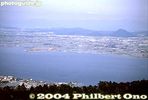
View of Lake Biwa and Otsu from Enryakuji Station. The conical Mt. Mikami in Yasu can be seen on the right.
|
|
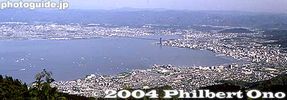
View of Lake Biwa and Otsu from Enryakuji Station.
|
|
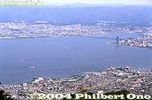
View of Lake Biwa and Otsu. Omi Ohashi Bridge in the background. The towering building is Otsu Prince Hotel.
|
|

Entrance to Enryakuji's Todo complex. Admission charged.
|
|

If you go by bus, this is the entrance to Enryakuji from the parking lot.
|
|
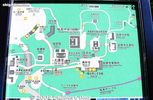
Map of Enryakuji's Todo complex.
|
|

Model of Mt. Hiei and Enryakuji.
|
|

Manpai-do Hall
|
|

Inside Manpai-do Hall
|
|

Daikokudo Hall
|
|

Inside Daikokudo Hall
|
|

Way to Kompon Chudo Hall.
|
|

Approaching Konpon Chudo Hall or temple. Note that the Konpon Chudo (National Treasure), is undergoing a major renovations until 2025. Parts of it might be covered or closed to visitors. T
|
|

Konpon Chudo Hall is a National Treasure and Enryakuji's main worship hall and largest building. It enshrines Yakushi Nyorai, the buddha of healing and health. 根本中堂
|
|

Slope going down to Konpon Chudo Hall
|
|
|
|

Konpon Chudo Hall has corridors.
|
|
|
|

Entrance to Konpon Chudo Hall. Note that since 2016, the Konpon Chudo Hall is undergoing a 10-year renovation project. You may see scaffolding and certain parts might be closed to visitors.
|
|
|

Where you take off your shoes to enter Konpon Chudo Hall.
|
|

Roof corner of Konpon Chudo Hall, a National Treasure.
|
|

The inner courtyard of Konpon Chudo Hall. Unfortunately, we are not allowed to photograph inside the hall which has three lanterns with an eternal flame.
|
|

Kompon Chudo temple
|
|

About Kompon Chudo (in English, Hangul, and Chinese). Enryakuji has multi-lingual signs explaining the important buildings.
|
|

Monks
|
|

Enryakuji has numerous monuments.
|
|
|

Miyazawa Kenji poem monument
|
|
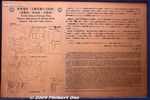
World Heritage Site plaque
|
|

Steps to Monjuro Gate which faces the Konpon Chudo.
|
|

Monjuro tower houses a statue of the Manjusri bodhisattva (Monju bosatsu). It looks like a gate, but it's not.
|
|

Inside Monjuro
|
|

Inside Monjuro is an altar.
|
|

Monjuro altar with Manjusri bodhisattva (Monju bosatsu).
|
|

Monjuro Tower
|
|
|
|

Shoro bell tower 鐘楼
|
|

Offer 50 yen to ring the bell.
|
|
|
|

Daikodo Hall 大講堂
|
|

Inside Daikodo Hall are portraits and sculptures of founders of Japanese Buddhist sects. Honen, Shinran, Nichiren, etc. 大講堂
|
|

Honen and Shinran
|
|

About Daikodo Hall.
|
|

Daikodo Hall
|
|

Daikodo Hall
|
|
|
|

Steps to Kaidan-in temple
|
|

Kaidan-in temple
|
|

Photo of the altar inside through a narrow slit.
|
|

About Kaidan-in temple
|
|
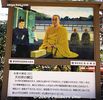
Picture panels telling the stories of Saicho and other founders.
|
|
|

Kokuho-den is a museum of temple treasures. This is next to the parking lot. Admission charged, in addition to the Enryakuji admission fee.
|
|

Another nice building to photograph is this Hokke Soji-in Toto pagoda.
|
|

This Hokke Soji-in Toto pagoda was rebuilt by the Sagawa Kyubin courier service and other donations in Oct. 1980. The original structure was torched in the 16th century.
|
|

Inside the pagoda.
|
|

How the pagoda was reconstructed.
|
|
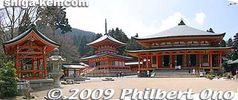
Hokke Soji-in Toto pagoda on the left and the Amida-do Hall on the right. Enryakuji temple, Mt. Hiei, Otsu, Shiga.
|
|

Amida-do Hall
|
|

Inside Amida-do Hall.
|
|

Amida-do Hall altar
|
|

About Amida-do Hall.
|
|

Door of Amida-do Hall
|
|

Soundscape garden in front of Amida-do Hall.
|
|

Soothing sounds of water, etc., can be heard. Almost Zen-like.
|
|
|

Now I walked from Todo to the Saito temple complex.
|
|
|

Cross a short bridge to Sanno-in temple.
|
|

Sanno-in temple in Saito temple complex of Enryakuji.
|
|
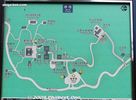
Map of Saito complex in Enryakuji.
|
|
|

It was some distance to walk, but all downhill.
|
|
|

Jodo-in temple
|
|
|

Jodo-in temple
|
|

About Jodo-in temple
|
|

Entrance gate to Saito from the parking lot.
|
|
|
|
|

Tsubaki-do Hall.
|
|

Minobuchi Benzaiten shrine
|
|

Site where Saint Shinsei trained at Enryakuji.
|
|

Site where Saint Shinran trained at Enryakuji.
|
|

Ninai-do Hall consists of two halls connected by a corridor.
|
|

On the left is Jogyo-do Hall.
|
|

On the right is Hokke-do Hall.
|
|

About Ninai-do.
|
|

Steps to Shaka-do Hall, the main hall in Saito.
|
|

Shaka-do Hall, Enryakuji
|
|

Shaka-do Hall
|
|

About Shaka-do Hall
|
|

Inside Shaka-do Hall
|
|

Shaka-do Hall altar
|
|

People chanting in front of Shaka-do Hall.
|
|

People chanting in front of Shaka-do Hall. They are ordinary folk undergoing a training program.
|
|
|
|

Buddha's giant footprints.
|
|

Buddha's giant footprints.
|
|

Site where St. Honen trained at Enryakuji. Right next to Shaka-do.
|
|
|
|

Path to Ruri-do, the only building that was not torched by Oda Nobunaga in the 16th century. Unfortunately, it was too far for me to reach.
|
|

Shuttle buses run between all three temple complexes. I took the shuttle bus from Saito to Yokawa which was too far away to walk.
|
|

View during the bus ride.
|
|

Gate to Yokawa temple complex in Enryakuji.
|
|

The entrance pathway has picture panels explaining about the famous founders of Japanese Buddhist sects.
|
|

About St. Shinran
|
|
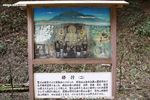
About St. Shinran at Enryakuji.
|
|

Map of Yokawa
|
|

Tatsugaike Pond and Benzaiten shrine
|
|

Konpon Nyoho-to pagoda
|
|

Konpon Nyoho-to pagoda
|
|

There are these small Buddha statues all over Yokawa.
|
|
|
|
|

Stilts of Yokawa Chudo Hall, the main hall in Yokawa.
|
|

Yokawa Chudo Hall in Enryakuji, Mt Hiei, Otsu, Shiga.
|
|
|
|

Yokawa Chudo Hall
|
|

Altar inside Yokawa Chudo Hall
|
|

Altar inside Yokawa Chudo Hall
|
|

Inside Yokawa Chudo Hall
|
|

Inside Yokawa Chudo Hall are numerous little Buddha statues.
|
|

Yokawa Chudo Hall balcony
|
|

About Yokawa Chudo Hall.
|
|
|

Sekizan-gu Shrine
|
|

About Sekizan-gu Shrine
|
|
|
|

Shoro Bell tower
|
|

Bell tower
|
|

Grave
|
|
|

Eshin-do temple
|
|

About Eshin-do temple
|
|
|
|
|
|

Ganzan Daishi-do Hall
|
|

Gate to Ganzan Daishi-do Hall
|
|
|

Ganzan Daishi-do Hall
|
|
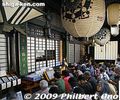
Inside Ganzan Daishi-do Hall
|
|
|
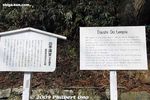
About Ganzan Daishi-do Hall
|
|
|
|
|

Benzaiten
|
|

Gyo-in training hall (not open to the public).
|
|

Path to Joko-in temple.
|
|
|

Joko-in temple.
|
|

Joko-in temple.
|
|

Statue of Nichiren at Joko-in temple.
|
|

Statue of Nichiren at Joko-in temple.
|
|
|
|

Thank you for coming to worship. From here, I caught a shuttle bus back to the Enryakuji cable car station.
|
|

The Enryakuji shuttle bus runs every day between the cable car station, Toto, Saito, and Yokawa during March 21 to Nov. 30 from 10 am to 4:30 pm. They don't run that often so check the bus times.
|
|

Monk with a nice car.
|
|

Cable car back down to Sakamoto.
|
|

Cable car back down to Sakamoto.
|
|

Observation tower in Garden Museum Hiei, a tourist attraction on the summit of Mt. Hiei.
|
|

Observation deck
|
|

Garden Museum Hiei as seen from the lookout deck
|
|

Entrance to Garden Museum Hiei
|
|

Views of Lake Biwa from Hiei-zan Driveway. The city of Otsu.
|
|

Karasuma Peninsula in Kusatsu. There is a large lotus pond behind the windmill. About 20 min. by bus from JR Kusatsu Station.
|
|

Lookout point along Hie-zan Driveway. This was my favorite.
|
|

Biwako Ohashi Bridge
|
|
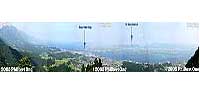
Panoramic view of Lake Biwa from Mt. Hiei.
|
|

Bus service is also available along Hiei-zan Driveway.
|
|
|
|
|